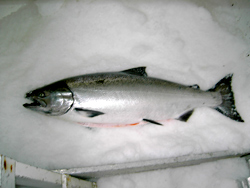For many, the arrival in the market of fresh wild salmon is the high point of the Northwest gustatory year. Thank to the tireless evangelizing of Seattle food promoter Jon Rowley, virtually every seafood lover in North America knows that salmon from the annual May run in Alaska’s Copper River delta are among the tastiest marine morsels on earth.
But after a decade of promotion, “Copper River salmon” have been all but commodified, turning up not just in gourmet fish cases but shrink-wrapped at your corner superette. Apart from concern about just how authentic (and fresh) some of that product may be, gourmets miss that special feeling of being an exclusive band prepared to pay through the nose for the best.
Fortunately for them, there are alternatives: wild Yukon River salmon, for example, even more bursting with healthful omega-3 fatty acids. Without a Rowley to carry the ball for them, the Yup’ik fisherfolk who harvest Yukon salmon haven’t made as big a dent in the market as they deserve, but early adopters are lavish in its praise. And if you want to get even further ahead of the fashion curve, there’s a salmon to be had even fresher, even more cosseted from hook to plate, right here in our backyard.
The fish in question are troll caught in the waters off Washington, Oregon, and Vancouver Island. During their short season (May–June, and again later in July), Native American and nontribal fisherfolk (there are no more than 85 boats actively licensed to fish the run) conduct the most labor- intensive, hands-on fishery in America. Each boat is equipped with four to six lines fitted with barbless hooks. Fish are reeled in one by one when they strike, stunned with a club while still in the water, lifted onto dimpled urethane pads (to prevent scale loss), bled instantly, then cleaned, the gut cavity packed with ice, and buried in more ice, not to be touched again until the ship docks.
Some readers may be surprised that there are enough wild salmon in these parts to justify a commercial fishing season. In fact, the fishery was nearly destroyed, not by overfishing but by regulation. There were no fish allowed to be caught in 1993–94, and people who had been trolling for generations either got out of the business or took their boats elsewhere. It’s only recently, with fisherfolk finally getting decent prices for their wild catch again, that trollers have banded together to try to earn back their own fair share of the market.
Fisherfolk who follow the detailed rules for handling issued by the Washington Trollers Association can (and do) claim to deliver the most perfect salmon possible to commercial clients. They are particularly proud of the catch of so-called “marbled” king salmon. A little-known variety that until recently was considered to result from an accident of diet or lifestyle now appears to be a true-breeding clone of its own, with subtle but distinctive flavor characteristics and mouth-feel. Marbled king routinely wins chef taste tests when sampled alongside the standard product.
This week, the Trollers Association and the Makah Nation are hosting the second annual to-the-trade luncheon tasting of their wares at Johnathan Sundstrom’s Lark restaurant. Response from high-end restaurateurs has been strong; so strong that there hasn’t been a lot of incentive for the trollers to look for retail outlets for their fish. (Why split the profit with a middleman if you can sell all your fish direct?) But a few markets with discriminating clients carry local troll-caught salmon. Be strong. Ask your fishmonger where that fish comes from, and how it was hooked, cleaned, stored, and shipped. With a top-end fish going for $25 a pound and up, you have every right to know its complete CV.
True gourmets determined to be on the cutting edge of the salmon sweepstakes needn’t leave all the good stuff to the restaurants, however. Using the principle of Six Degrees of Kevin Bacon, surely you know somebody who knows somebody who trolls for salmon? The Port of Seattle doesn’t make it easy for fisherfolk to deal with individual customers at their moorage, so you may need to rendezvous in a convenience store parking lot to hand off the fish. But that just adds to the romance. And what a fine story to tell over glasses of pinot noir while the fish grills on the patio.








